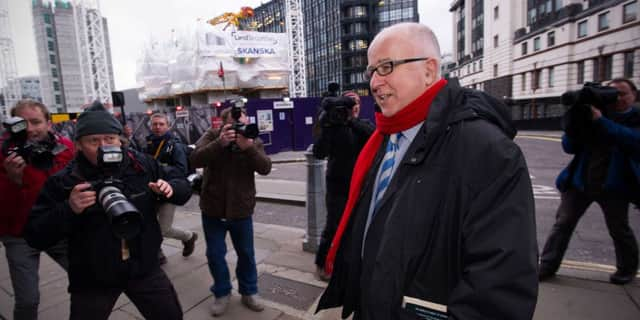Ex-MP Denis MacShane jailed for expenses fraud


The ex-MP, who served in Tony Blair’s Cabinet as Europe minister, had previously pleaded guilty to false accounting by filing 19 fake receipts for “research and translation” services. Sentencing MacShane at the Old Bailey yesterday, Mr Justice Sweeney told the Glasgow-born politician he had “no-one to blame but yourself”, adding: “The dishonesty involved was considerable and was repeated many times over a long period.
“The deception used was calculated and designed to avoid suspicion falling on your claims.”
Advertisement
Hide AdAdvertisement
Hide AdMacShane said “Cheers” as the sentence was delivered, before adding “Quelle surprise” as he was led from the dock.
His guilty plea followed more than four years of scrutiny into his use of Commons allowances.
The offence of false accounting covered 19 “knowingly misleading” receipts that MacShane filed between January 2005 and January 2008.
The 65-year-old used the money to fund a series of trips to Europe, including one to judge a literary competition in Paris. The court heard that MacShane incurred “genuine expenses” but chose to recoup them by dishonest false accounting rather than through legitimate claims.
Mr Sweeney said: “However chaotic your general paperwork was, there was deliberate, oft repeated and prolonged dishonesty over a period of years – involving a flagrant breach of trust and consequent damage to Parliament, with correspondingly reduced confidence in our priceless democratic system and the process by which it is implemented and we are governed.”
The judge said he had considered a number of mitigating features, including MacShane’s guilty plea, and that the offences were “not committed out of greed or for personal profit”.
MacShane had suffered “a long period of public humiliation” and carried out the offences “at a time of turmoil” in his personal life, Mr Sweeney said.
The court heard that MacShane and his wife divorced in 2003, his daughter Clare was killed in an accident in March 2004, his mother died in 2006 and his former partner, newsreader Carol Barnes – Clare’s mother – died in 2008.
Advertisement
Hide AdAdvertisement
Hide AdThe judge also considered his previous good character and that the money had been paid back. Mr Sweeney told MacShane that he acknowledged a difference between his case and other MPs sentenced following the expenses scandal.
However, MacShane “deliberately created misleading and deceptive invoices and then used them in order to procure payments of public money”, the judge added.
“You must therefore have been aware throughout that it was an essential feature of the expenses system then in operation that Members of Parliament were invariably treated as honest, trustworthy people, and that the unwritten assumption was that only claims for expenses genuinely incurred in accordance with the rules would be made,” Mr Sweeney said.
“Yet you acted in flagrant breach of that trust.”
Following the sentencing, former Labour transport minister Tom Harris, who has known MacShane since 2001, said his ex-colleague should not have been jailed because he did not gain personally, unlike other MPs who had been sent to prison as a result of the expenses scandal.
Parliamentary authorities began looking at MacShane’s expense claims in 2009 when the wider scandal engulfed Westminster, and referred him to Scotland Yard within months.
But the principle of parliamentary privilege meant detectives were not given access to damning correspondence with the standards commissioner in which MacShane detailed how signatures on receipts from the European Policy Institute had been faked. The body was controlled by MacShane and the general manager’s signature was not genuine.
It was not until after police dropped the case last year that the cross-party standards committee published the evidence in a report that recommended an unprecedented 12-month suspension from the House.
MacShane resigned as MP for Rotherham in South Yorkshire last November, before the punishment could be imposed.
Police then reopened their
Advertisement
Hide AdAdvertisement
Hide Adinquiry in the light of the fresh information and he was charged.
Westminster scandal saw cheats exposed
David Chaytor was the first ex-MP to be jailed for expenses offences when in January 2011 the former Labour MP was sentenced to 18 months after admitting three charges of false accounting and fraudulently claiming more than £20,000.
The following month, another former Labour MP, Eric Illsley, was given a year’s sentence after he pleaded guilty to £14,000 of expenses fraud relating to his second home. In March 2011, former Labour MP for Livingston Jim Devine, left, was sentenced to 16 months in prison for expenses fraud for submitting false invoices for cleaning and printing work totalling £8,385.
Two months later, former Labour minister Elliot Morley was sentenced to 16 months in jail after pleading guilty to dishonestly claiming more than £30,000 in parliamentary expenses.
Another former Labour MP, Margaret Moran, received a two-year supervision and treatment order in December 2012 after she claimed nearly her entire annual allowance in one bogus expense entry and forged invoices for more than £20,000 of non-existent goods and services. Tory peer, Lord John Taylor of Warwick, below, was jailed for a year in June 2011 for defrauding the taxpayer of more than £11,000, while his Conservative colleague in the House of Lords, Lord Paul White of Hanningfield, was sentenced to nine months in prison on six counts of false accounting relating to nearly £14,000 of claims.
SEE ALSO